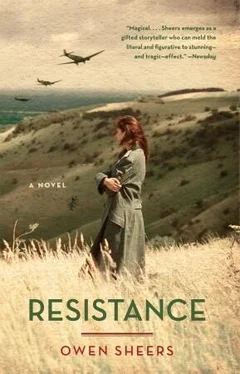“I didn’t know he was a poet, though,” Sarah said, frowning.
“I think he was many things, from what I can tell.”
They walked on in silence, testing their footing before trusting their weight to each piece of broken rock. The valley below them was waking. The bleats of lambs pestering their mothers for milk filtered up from the fields below.
“His house is still there you know,” Sarah said, pausing again between two slabs of sandstone, one of them rocking slightly under her foot. “Landor’s. Just ruins, but I could show you if you wanted.”
Albrecht looked her in the eye for a moment. He wanted her to smile again. The few times he’d seen her do so were like the gift of light to this valley. The slightest lifting of the corners of her mouth transformed her features, making her face at all other times seem like a mask. But if anything, Sarah looked scared now, timid in the wake of her offer to show him Landor’s house. Even so, as he looked at her for that brief moment, Albrecht could not believe he’d once felt numb to her. Roughly attired though she was he knew that given the same cut of clothes, lipstick, hairstyles as women he’d known in Dresden, London, and Oxford, her broad face, green and gold eyes, delicate lips, would eclipse them all. Maybe even Ebbe, whose memory he still considered more seductive than most women he’d met in the flesh.
He drew his eyes away from her face and looked over her shoulder towards the mouth of the valley. From here, in the clear morning, the country was laid out before them. He could even make out the clusters of hamlets and villages in the distance. It all looked so close and yet so impossibly far away. But it was there, that couldn’t be denied, waiting like a long-postponed tide on the verge of breaching the coast once more.
He looked back at Sarah, but it was she who spoke next. “If we went early no one would see us,” she said. “It’d be safe.”
Albrecht felt the muscles across his brow ease. She understood. This was a choice beyond just his own. “Yes,” he said at last. “Yes, I’m sure it would. Thank you.”
Bethan’s leaving the valley had caught Albrecht off guard. At first he couldn’t understand why her mother would commit such a self-harming act. He knew she was concerned by Bethan’s attraction to Gernot, but she’d already lost all contact with both her sons and her husband, and now she was depriving herself of her daughter too. And at what cost? She knew as well as the others the consequences of their being linked to the insurgency in any way. His concern, however, was not just for Mary. Bethan’s leaving had endangered them all.
Since the onset of spring the valley had found a strange harmony, more settled than Albrecht could ever have hoped. Alex spent much of his time rediscovering the farming of his boyhood, and therefore himself. He worked with Maggie’s cows and horses, helped her halter-train the colt, built fences and, when needed, handled the plough. Otto had also stumbled upon his own kind of peace, finding an understanding in Edith’s ragged world, confused at its edges but possessed, for him, of a clarity at its centre. The others, meanwhile, even Steiner, had come to accept the valley as a refuge in which to bide their time and wait for what would happen once the dust of the war had settled. For Sebald, it was perhaps even more than this. “As good a place to end up as any,” is what he’d once said to Albrecht when they’d paused in a walk to take in the full view of the valley’s length. “And better by far than most.”
The women too appeared to be more accepting of the situation. At times Albrecht even thought he detected a genuine gratitude for their presence. When Maggie looked to the tasks waiting in the months ahead, for example; to the shearing, dipping, and hay-making, the old woman seemed relieved to think they would not be facing these alone.
At first Albrecht had been careful to limit the contact as much as he could, but now the dependence between the women and the patrol had developed its own rhythm and metre. He was no more the conductor of events, but merely an observer of what he’d created. Slowly, despite the language barriers, he felt the patrol were becoming less German in the women’s eyes and more just men. Men who’d been washed up on their doorsteps, carrying with them their own losses, just as the women did the loss of their husbands.
This shadow of their missing husbands was, of course, always there, and made darker by the intermittent wireless reports of the ongoing insurgency. But even this was now woven into the everyday fabric; an unseen and mostly unspoken weight of absence, which, together with the war, worked as a counterbalance to their lives in the valley. Reminders of why all of them were still here, sharing this slice of isolated land between the thumb and forefinger of the Black Mountains Hand.
When Albrecht noticed the change in Gernot’s behaviour after Bethan had left, he knew why Mary had sent her daughter away, but it did little to ease his concern. The balance they’d achieved in the valley was just that: a calibration that kept their fragile vessel upright but that might be tipped at any moment. In leaving the valley Bethan had punctured the hull of this vessel. She’d left behind a hole in the shape of herself through which Albrecht feared they would be contaminated. Just like the sandstone out of which the valley was made, they would all, once exposed to the realities of the outside world, be forced to calcify and harden.
Bethan’s leaving, however, still worried Albrecht far less than her return. When he’d asked Maggie about this the old woman had been unclear as to when the girl might come back. His only hope was that when she did, she would bring with her nothing more harmful than confirmation of the news reports that kept them here. The reports that still spoke of the war in the present tense. That hinted at a Russian resurgence behind the Urals threatening to break out into the west. The reports that suggested the war was not dead, just dormant, and it could still kill them all, given half the chance.
Albrecht was perhaps most affected by the ease with which Bethan had left. A packed lunch, a walk to the valley’s head, a thousand yards across the plateau, and she’d been gone. That was all it had taken for her to leave their world. Still six miles or so from her destination of Hay-on-Wye, but gone. The simplicity of it stirred something within him. A desire, despite all his better judgment, to see outside the valley walls himself. Not to leave them, but to see, just for a moment, the outside world close to his face and not from the distance of a view. But this desire, this sudden need in him triggered by Bethan’s leaving, was not the only reason he accepted Sarah’s offer to show him the ruins of Landor’s house. It was the first time she’d ever given him anything, any possibility beyond the present. As a consequence it was also the first time since he’d taken her the gramophone and played her the cello suite that Albrecht could allow himself some hope.
“There, see that path? Where it goes in the dingle? That’s where it is.”
Albrecht followed the line of Sarah’s pointing finger. He could see nothing but a clump of trees, thick with new foliage. But the position would have been right. According to the biography he’d read Landor had been at pains to build up the slope, away from the ruins of the priory beneath.
Sarah dropped her arm. They were sitting on a stile at the edge of a small wood. It was the first time they’d stopped since they started out from the Olchon just before dawn. The plateau of the Hatterall had been broader than Albrecht expected, thick with bilberry bushes and purple heather. Twice they’d disturbed skylarks from their nests and stood and watched as the startled birds ascended above them, disappearing up the threads of their songs.
Читать дальше












